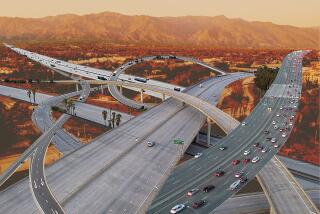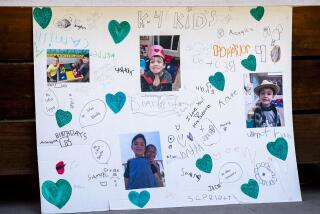Unkindest Cuts of All Call for Defensive Ploys
Hey! Where did he come from? No time to answer that question now, not at 55-plus m.p.h. on a crowded freeway. Looks as if we just got cut off, again, by a driver on whom assertiveness training would be wasted. With no turn signal and nary a glance over his shoulder, he just slipped in, assuming that the car length of space in front of us was reserved for him.
So you hit the brakes--what else?--and swerve if necessary, anything to keep from plowing into him. Those tactics might get you bashed from behind or send you into the center divider or one (or more) of the cars around you. And the reckless guy who started it all will be so far down the road by then that he will not even see it in his rear-view mirror.
But wait--there may be an easier way. How about just slowing down yourself?
That is what Helen and Edward Shanbrom of Santa Ana suggest. They have been studying the car-cutoff phenomenon since their son, David, was killed by an out-of-control, speeding truck on the Orange Freeway three years ago. The driver of the truck said he lost control and jackknifed across the center divider after a car cut in front of him.
Helen Shanbrom has been the force behind several important pieces of truck safety legislation in California. But some things are better changed by public education than legislation; the Shanbroms believe that the cutoff car is one of them.
Cutoff cars are often blamed for accidents, although by the time the police arrive they are usually long gone. That is why they are often referred to by another name: phantom cars.
After their son was killed, the Shanbroms asked accident reconstruction expert Joseph W. Thompson to analyze what happened. In his report, Thompson said: “If the truck driver had removed his foot from the accelerator instead of swerving to the left . . . it is clear that the vehicles would be separated at the end of three seconds by a minimum distance of 14.49 feet to 90.81 feet, depending on the speed of the (cutoff) car.”
There were so many other factors in the accident that the Shanbroms did not focus on the cutoff car at first. “But then we were on a trip to New York,” Edward Shanbrom said, “and we noticed how the taxi drivers handled being cut off. It happens to them all the time, and they hardly ever hit the brakes. All they do is let up on the gas, and that works fine.”
After they came home, the Shanbroms paid particular attention to their own driving and found that they rarely had to use the brakes when someone cut them off, whether they were on the freeway or a surface street.
“The problem is that most people overreact when they get cut off,” said Ken Daily of the California Highway Patrol’s San Juan Capistrano station, who is also a traffic school instructor. “They panic, hit the brakes and swerve. Then they start heading off in another direction, so they overcompensate by swerving the other way.”
Sometimes, of course, you have no choice but to hit the brakes, Daily said. But you can make that less likely by thinking ahead.
“Always have an escape route,” he said. “Pay attention to the traffic around you. Change your position relative to the cars around you. Don’t stay next to a truck; if he has a blowout, he’ll run you over.”
Drivers who cut in front of other drivers “are usually what starts the little conflicts on the freeway. You cut somebody off, then he’s got to go up and cut you off. I’ve seen some pretty serious accidents resulting from that kind of thing.
“A lot of people think you just have to get in front of people. We hear it all the time, ‘I had to speed up to change lanes.’ Well, did you ever think of slowing down instead? That’s why we call the fast lane the ‘ego lane.’ ”
Psychiatrist Martin Brenner agreed. In his Stresscare Driving program, he advises clients not to take cutoffs personally.
“If someone cuts in front of you, just let them. You have to learn how to overlook things,” said Brenner, medical director of Santa Ana Hospital Medical Center.
“People see (a cutoff) as an affront to their dignity,” he said. “They think, ‘I can’t let them get away with that!’ They may try to stop them, and that’s not very smart.
“The anonymity of the freeway gives you a chance to demonstrate power. A lot of people become road warriors, and they put themselves under a lot of stress.”
Whatever you do when another car cuts you off should be done gradually, Brenner said: “Whenever you need to make an abrupt action, it probably means you haven’t driven defensively.”
If your reaction to a cutoff car gets you in an accident, do not expect sympathy from the CHP. “What you do is your responsibility,” Daily said.
We all have to change lanes now and then but, Daily said, there are measures we can take to avoid cutting off other cars.
“Never change lanes next to somebody, even if there’s a lane empty between you,” he said. “I’ve seen a lot of cases where both cars tried to get in that lane at once and then swerved back and fishtailed.
“Don’t depend on the rear-view mirror. Always look over your shoulder before you change lanes. And don’t forget to use your turn signal so that the folks around you will have some idea what you’re planning to do.”
Looking Like New
Do you wash your car often? Or do you wait until the kids can write graffiti in the dust? We’d like to know about your car-cleaning habits, inside and out. Do you wash it yourself? What kind of cleaner works best? Do you insist on a chamois, or will paper towels and rags do just as well? Maybe you go to a carwash. Or do you prefer having your car detailed?
A Little Road Music
What’s the sound track for your daily commute? Do you prefer rock to get you going or easy listening to calm your nerves? Maybe you keep it on the all-news channel. Tell us what you like to listen to when you drive, and why.
Send your comments to Life on Wheels, Orange County Life, The Times, 1375 Sunflower Ave., Costa Mesa, Calif. 92626. Please include your phone number so that we can contact you. To protect your privacy, Life on Wheels does not publish correspondents’ last names when the subject is sensitive.
More to Read
Sign up for Essential California
The most important California stories and recommendations in your inbox every morning.
You may occasionally receive promotional content from the Los Angeles Times.










